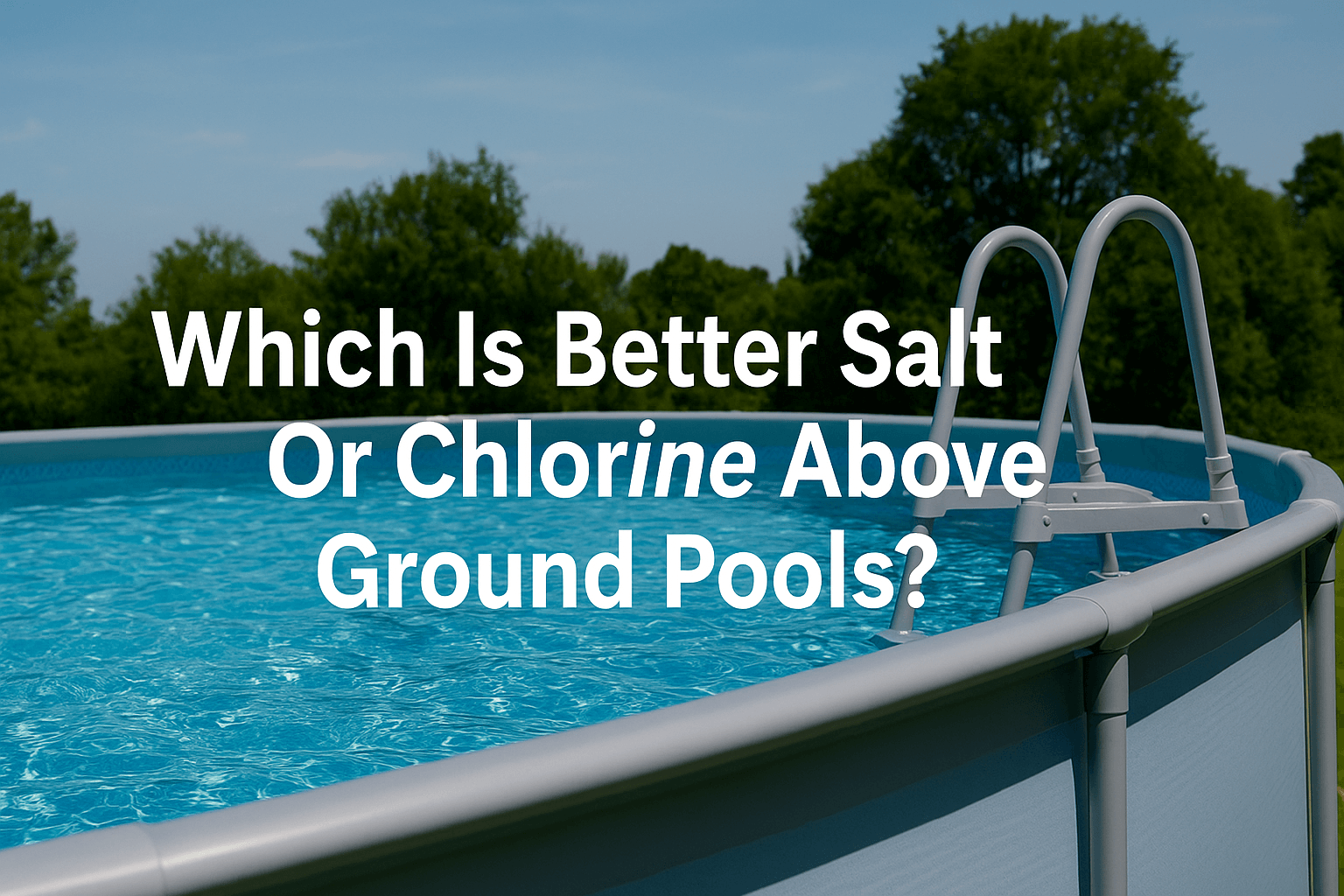
Which Is Better Salt Or Chlorine Above Ground Pools?
Dreaming of a large swimming pool for adults but stuck on salt vs chlorine? Short answer: saltwater feels softer and kinder, chlorine wins on upfront cost. But the full story isn’t that simple—comfort, upkeep, and budget all matter. Keep reading to see which pool truly fits your family.
Salt vs. Chlorine: The Head-to-Head Comparison
How Each System Works
The Saltwater Generator Process
Saltwater systems don’t mean swimming in seawater. Instead, a clever device called a saltwater generator turns ordinary salt into chlorine. This keeps the water clean without you lugging around buckets of chemicals.
Families often notice the difference straight away—less stingy eyes, softer-feeling water, and no overpowering “pool smell”. The catch? The equipment costs more upfront and you’ll need to keep an eye on salt levels and clean the cell every so often.
The Traditional Chlorine System
Chlorine systems are the old faithful. You drop in tablets or pour in liquid chlorine, and the water stays safe to swim in. It’s quick, affordable to start, and simple enough for first-time pool owners.
The downside? The smell is strong, and the water can sometimes leave your eyes red after a splash-about. Still, many families stick with chlorine because it’s tried, tested, and familiar.

The Impact on Water Quality and Comfort
Skin and Eye Irritation
Ask any parent and they’ll tell you—the kids don’t last long if the water stings their eyes. Saltwater is a gentler option, making it popular for families with little ones or sensitive skin.
Chlorine pools can still be fine, but they need careful balancing. Skip a check or two and you might notice dry skin or red eyes after a swim.
Water Clarity and Feel
Saltwater pools often get praised for their silky feel. Many swimmers describe the water as “softer” and more enjoyable for long swims.
Chlorine pools, when maintained well, can be just as clear and inviting. But you’ll need to stay on top of the testing kit to keep that balance right.
Cost, Maintenance, and Longevity
Initial Setup Cost
Here’s where saltwater loses a point. Installing a saltwater system usually sets you back between £1,500 and £2,500. A chlorine system, on the other hand, costs far less—often under £1,000 to get going.
Ongoing Chemical and Maintenance Costs
Once you’re set up, saltwater starts to pay off. Expect to spend around £300–£500 a year. Chlorine, by comparison, comes in at £500–£1,000 a year thanks to the constant need for tablets and treatments.
Saltwater does need its salt levels monitored and the generator cell cleaned now and then. Chlorine demands more regular attention—checking, topping up, and occasional shock treatments.
Equipment Lifespan
Nothing lasts forever, not even pool kit. With saltwater, the generator’s salt cell will eventually need replacing, which adds to the long-term cost. Salt can also cause corrosion if your equipment isn’t fully compatible.
Chlorine avoids the corrosion issue but does put the burden on you to keep up with maintenance more frequently.

How to Choose the Right System for You
When to Choose a Saltwater Pool
Best for Sensitive Skin
If your family has sensitive skin or you want water that feels gentle, saltwater is hard to beat. It’s a great pick if you’ve got young kids who spend hours in the pool.
The "Set It and Forget It" Appeal
Once the system is up and running, it handles most of the hard work. You’ll spend less time fussing over test strips and more time actually enjoying your pool.
When to Choose a Chlorine Pool
The Lower Initial Cost
If your budget is tight, chlorine wins. You can get your pool up and running at a fraction of the cost of saltwater.
The Familiarity of the System
There’s comfort in routine. Chlorine pools are what most of us grew up with. If you like the idea of a system you already know, this is the option for you.

Final Considerations
Your Budget and Time Commitment
Think about what matters most. Do you want the cheaper start and don’t mind a bit more hands-on maintenance? Chlorine is your friend. Prefer gentler water and less day-to-day hassle, even if it costs more upfront? Saltwater’s the way to go.
Local Regulations
One last thing—check local rules. Some areas may have restrictions or extra guidelines about which pool systems are allowed. It’s always worth a quick look before making your final choice.
Bottom line: Saltwater pools give you comfort and easier upkeep, but they’ll hit your wallet harder at the start. Chlorine pools are budget-friendly and straightforward, though you’ll be rolling up your sleeves more often.
Either way, both will keep your above ground pool sparkling—and ready for those lazy summer afternoons you’ll be glad you invested in.
Have you checked out our other posts?
Landscaping Around Above Ground Pools
Above Ground Pools Pros And Cons
How Long Do Metal Frame Pools Last


Leave a comment